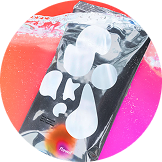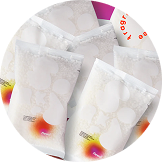Tired of lying in bed with your mind spinning while your body refuses to let go? Every minute that passes equates to more exhaustion, grogginess, and brain fog the next day. It’s so frustrating - and it’s often linked to one thing. Stress!
That’s why magnesium is a common remedy for getting a better night’s sleep. It’s a natural way to calm a racing mind and tense body, setting the foundation for deep rest. But not all forms of magnesium are created equal.
We see magnesium carbonate vs citrate for sleep compared all the time. Each has its place. What if we told you neither was the best choice for sleep, though? Your next question would probably be, what type of magnesium is best for sleep? Magnesium chloride.
This form absorbs through the skin, bypasses digestion, and goes straight to work calming the body and easing tension. We’ve taken things a step further with our Insomnia Ending bath soak here at Flewd Stresscare, though, pairing it with vitamins A & E and L-carnitine for more oomph.
More than 100,000 happy customers and counting trust our magnesium bath soaks, and you can too. Learn more about magnesium citrate vs magnesium carbonate below, or put insomnia in the past for good at Flewd Stresscare!
“I cannot begin to tell you how much I love this stuff!! So does my daughter. She had the best night's sleep after the insomnia one!” - Alisha
“I used the stress bath and felt amazing afterwards, best sleep I've had in a long time.” -
“Can't wait for bath time! I come out feeling like a whole new person. I sleep better, feel better, and the effects last for days. My supply is on autoship, so I don't have to go without. Definitely recommend.” - Quinn
Is Magnesium Carbonate the Same as Magnesium Citrate?
Let’s clear one thing up right away, because we see it asked all the time - is magnesium carbonate the same as magnesium citrate? We get the confusion because they’re both common forms of magnesium, often found in sleep supplements and multivitamins.
That said, they’re very different in terms of structure, absorption, and effect. Magnesium citrate is bound to citric acid so it’s more water-soluble and easier to absorb. Magneisum carbonate, on the other hand, requires more stomach acid to break down effectively.
This leads to very different experiences and outcomes in the end. So, let’s take a closer look at magnesium carbonate vs citrate for sleep below.
How Magnesium Carbonate Supports Sleep
Magnesium carbonate is a compound made of magnesium and carbonic acid. It’s actually used as an antacid or added to supplements for its stability and mild taste.
While it does supply elemental magnesium, its absorption in the body is relatively low unless stomach acid levels are high - something not everyone can count on.
But as far as sleep is concerned, magnesium carbonate may offer indirect benefits. That’s because magnesium in any form can play a role in relaxing muscles and regulating the nervous system.
The problem goes back to how it requires efficient digestion to be effective. Users find its impact on sleep is fairly inconsistent. People with low stomach acid (a common issue, especially with age or antacid use) may absorb very little from magnesium carbonate.
That makes it a less reliable choice for those looking for a consistent, nightly sleep aid. So, how does the other half of our comparison between magnesium carbonate vs citrate for sleep stack up?
How Magnesium Citrate Supports Sleep
Magnesium citrate combines magnesium with citric acid, which definitely improves its solubility and makes it one of the more absorbable oral forms. After all, most forms of magnesium are notorious for poor digestibility.
That said, magnesium citrate is most often used as a mild laxative because it draws water into the intestines. This can be a benefit or a side effect, depending on how you look at it.
But since you’re interested in comparing magnesium citrate vs magnesium carbonate for sleep, it’s probably the latter. You don’t need to be waking up in the middle of the night to use the bathroom!
Still, magnesium citrate might be able to relax muscles and ease tension just as any form of magnesium can. We’ve seen plenty of people report better rest after using it regularly, especially if they’re also dealing with constipation or general magnesium deficiency.
But this can be offset by the loose stools, cramping, or urgency around bedtime. You’ll have to weigh the upside vs the downside to determine if it’s worth trying or not.
Magnesium Carbonate vs Citrate for Sleep: Which is the Better Choice?
You’re making a great choice calling upon magnesium for sleep support, but it’s essential to choose the BEST form to make the most of all this mineral has to offer.
Ultimately, choosing between magnesium carbonate vs citrate for sleep comes down to a few factors - absorption, digestive tolerance, and results. That’s really all that matters. We’ll help you cut through the noise and find clarity below.
Comparison of Absorption Rates and Bioavailability
Magnesium citrate is better absorbed between the two, and it’s not particularly close. Its pairing with citric acid makes it more water-soluble and more readily used by the body - that is, as long as the digestive system is functioning well already.
Magnesium carbonate, on the other hand, needs higher stomach acidity to break down, which limits how much magnesium actually gets absorbed. You’ll need to take more of it to get the same results - and this is where the digestive tolerance side of things comes into play…
Digestive Tolerance and Side Effects
Absorption is definitely important, but it’s just one piece of the puzzle in comparing magnesium carbonate vs citrate for sleep. You need to take side effects into account as well.
Magnesium citrate’s downside is its tendency to cause digestive upset, especially in higher doses. Cramping, loose stools, and urgency are common. While magnesium carbonate may be less effective, it’s milder on the gut.
Ultimately, though, neither form is necessarily “gentle.” Both are oral supplements that can take a toll on your stomach and lead to unpleasant side effects. This is why you can’t beat transdermal magnesium chloride at the end of the day.
Impact on Sleep Quality and Relaxation
Let’s cut to the chase - which is more effective for sleep, between magnesium citrate vs magnesium carbonate? Citrate may help support sleep by relaxing muscles or easing tension, but this is often a secondary benefit, not a guaranteed result.
Conversely, carbonate offers even less in terms of direct nervous system support. This is the key takeaway from today’s conversation: neither is necessarily known for reliably improving sleep, reducing nighttime waking, or supporting the body’s stress response.
Magnesium citrate may help in the short term, but its digestive side effects limit its appeal for nightly use. Carbonate is gentler but not reliably effective. Both fall short for sleep-specific support. You shouldn’t settle for anything less than the best, and that’s magnesium chloride.
Why Magnesium Chloride is Really the Most Effective Form for Sleep
As we said from the start of this comparison between magnesium citrate vs magnesium carbonate, magnesium chloride outperforms each in just about every aspect - absorption, digestive tolerance, and results.
This is because it addresses the biggest barriers to quality sleep - stress, muscle tension, and nervous system overactivity. The best part, though, is it can be taken transdermally (through the skin) to bypass the digestive system altogether.
As soon as it's absorbed, it gets into the bloodstream and starts working. It supports GABA activation (the neurotransmitter responsible for calming brain activity), lowers cortisol levels, and helps relax tight muscles to support deeper rest.
These effects are especially helpful for people whose insomnia is driven by chronic stress, overstimulation, or physical discomfort. You won’t have to worry about bloating or diarrhea, either.
So, how long does it take for magnesium to work for sleep when you go with this form? You’ll probably feel it working its magic within 30-60 minutes. But the real benefits come from regular use over time. Consistency is key - and our stress relief bath soak is the best way to go about it.
Start Sleeping Better and Waking Up Feeling More Refreshed With Flewd Stresscare!
At Flewd, we built our Insomnia Ending soak specifically for people who are tired of chasing sleep. It’s the #1 epsom salt substitute because it uses magnesium chloride as the core ingredient to support the body’s natural ability to unwind, relax, and rest.
But, we’ve paired it with vitamins A & E to help support your sleep-wake rhythm and L-carnitine to aid overnight energy metabolism. Even the scent is conducive to a better night’s rest: a subtle, grounding blend of yuzu and soft florals is super relaxing.
You’ll love how easy it is to add to your self-care ritual, too. Fill a bathtub with warm (not hot) water and pour in the full pouch. Soak for at least 15 minutes - longer if you’d like.
You don’t need to rinse afterward, though you can. Our ingredients are vegan, cruelty-free, and 99% natural, so you won’t have to worry about dealing with skin irritation.
We recommend using our soak 3 times a week as part of your wind-down routine. Pair with dim lighting, low stimulation, and a consistent bedtime and you’ll be amazed at how easily you drift away to dreamland. See for yourself today!
Closing Thoughts on Magnesium Citrate vs Magnesium Carbonate for Sleep
That does it for our magnesium citrate vs magnesium carbonate comparison. Each form can supply magnesium, but neither is necessarily great for supporting deep, restorative sleep. Citrate absorbs better but can upset digestion. Carbonate is gentler but often poorly absorbed.
The good news? Magnesium chloride can help the body unwind naturally and reliably, especially in transdermal form. That’s why we use it across all our soaks here at Flewd Stresscare.
Our blog has more resources to help you get a better night’s sleep, like magnesium vs melatonin for sleep. But the only thing left to do at this point is put insomnia in the past for good with the help of Flewd Stresscare.
Give your body a form of magnesium it can actually use, without those uncomfortable side effects of oral supplements. Support sounder sleep with Flewd’s Insomnia Ending magnesium chloride soak!
























































